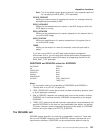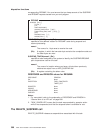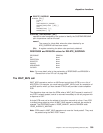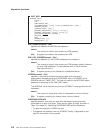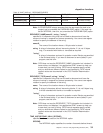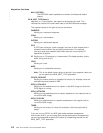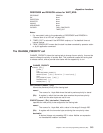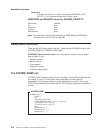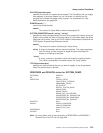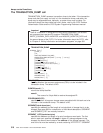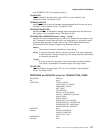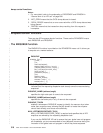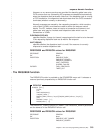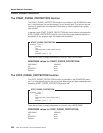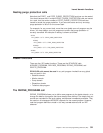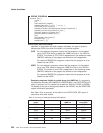CALLER(block-descriptor)
specifies the source of a system dump request. The information that you supply
here appears in the dump header, so you could use it to identify the exit
program that initiated the system dump request. For a description of valid
block-descriptors, see page 298.
DUMPID(name9 | *)
returns the dump identifier.
name9
The name of a 9-byte field to receive the assigned ID.
SYSTEM_DUMPCODE(name8 | string | "string")
specifies the code corresponding to the error that caused this system dump call.
System dump codes are held in the dump table; for information about the dump
table and how it works, refer to the
CICS Problem Determination Guide
and the
CICS System Programming Reference
manual.
name8
The name of a location containing an 8-byte string.
string A string of characters without intervening blanks. The macro generates,
from the string, a literal constant of length 8 bytes, extending with
blanks or truncating as required.
"string"
A string, enclosed in quotation marks and possibly containing blanks.
This value is processed in the same way as the “string” above.
TITLE(block-descriptor)
specifies an area containing the text you want to appear in the dump header
when the system dump is printed.
RESPONSE and REASON values for SYSTEM_DUMP:
RESPONSE REASON
OK None
EXCEPTION FESTAE_FAILED
INSUFFICIENT_STORAGE
IWMWQWRK_FAILED
NO_DATASET
PARTIAL_SYSTEM_DUMP
SDUMP_BUSY
SDUMP_FAILED
SDUMP_NOT_AUTHORIZED
SUPPRESSED_BY_DUMPOPTION
SUPPRESSED_BY_DUMPTABLE
SUPPRESSED_BY_USEREXIT
DISASTER None
INVALID INVALID_DUMPCODE
INVALID_PROBDESC
INVALID_SVC_CALL
KERNERROR None
PURGED None
Note: For more detail, refer to the explanation of RESPONSE and REASON in
“General form of an XPI call” on page 286.
dump control functions
Chapter 3. The user exit programming interface (XPI) 315



